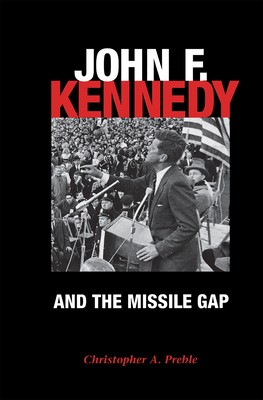
- We will send in 10–14 business days.
- Author: Christopher Preble
- Publisher: Northern Illinois University Press
- ISBN-10: 0875803326
- ISBN-13: 9780875803326
- Format: 15.1 x 22.3 x 2.1 cm, hardcover
- Language: English
- SAVE -10% with code: EXTRA
Reviews
Description
John F. Kennedy owed his victorious bid for the presidency--as well as his success in reversing former president Dwight D. Eisenhower's military and economic policies while in office--largely to his ability to exploit fears of an alleged Soviet strategic superiority, famously known as the "missile gap." Capitalizing on American alarms about national security, within months after his inauguration, he won Congressional authorization for two supplemental defense appropriations that collectively increased the defense budget by more than 15 percent. Yet, argues Christopher Preble, the missile gap was a myth. The Kennedy administration perpetuated that myth to justify a massive military buildup that had profound implications for both the domestic economy and for American foreign relations.
Eisenhower had warned against excessive military spending, but the missile gap scare shook the confidence of millions of Americans. In the face of presumed Soviet dominance, Eisenhower's New Look programs no longer appeared adequate. By electing Kennedy, U.S. citizens signaled their willingness to bear any burden in exchange for peace of mind. Little did they realize that Kennedy's new military strategy, known as Flexible Response, marked a commitment to a war economy that persisted through the final days of the Cold War.
The myth of the missile gap and the policies that followed had a profound impact on U.S.-Soviet relations. But by inducing doubts about America's capacity for world leadership, it also weakened the resolve of the nation's allies. On the home front and in the international arena, the missile gap shaped the outcome of the Cold War.
EXTRA 10 % discount with code: EXTRA
The promotion ends in 19d.17:11:03
The discount code is valid when purchasing from 10 €. Discounts do not stack.
- Author: Christopher Preble
- Publisher: Northern Illinois University Press
- ISBN-10: 0875803326
- ISBN-13: 9780875803326
- Format: 15.1 x 22.3 x 2.1 cm, hardcover
- Language: English English
John F. Kennedy owed his victorious bid for the presidency--as well as his success in reversing former president Dwight D. Eisenhower's military and economic policies while in office--largely to his ability to exploit fears of an alleged Soviet strategic superiority, famously known as the "missile gap." Capitalizing on American alarms about national security, within months after his inauguration, he won Congressional authorization for two supplemental defense appropriations that collectively increased the defense budget by more than 15 percent. Yet, argues Christopher Preble, the missile gap was a myth. The Kennedy administration perpetuated that myth to justify a massive military buildup that had profound implications for both the domestic economy and for American foreign relations.
Eisenhower had warned against excessive military spending, but the missile gap scare shook the confidence of millions of Americans. In the face of presumed Soviet dominance, Eisenhower's New Look programs no longer appeared adequate. By electing Kennedy, U.S. citizens signaled their willingness to bear any burden in exchange for peace of mind. Little did they realize that Kennedy's new military strategy, known as Flexible Response, marked a commitment to a war economy that persisted through the final days of the Cold War.
The myth of the missile gap and the policies that followed had a profound impact on U.S.-Soviet relations. But by inducing doubts about America's capacity for world leadership, it also weakened the resolve of the nation's allies. On the home front and in the international arena, the missile gap shaped the outcome of the Cold War.


Reviews